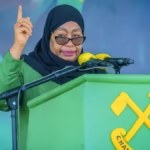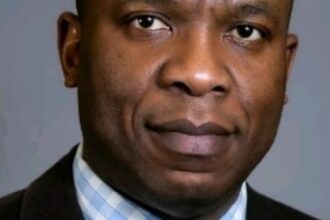By Dr Uzor Ngoladi
Nigeria’s long-cherished image as the “Giant of Africa” took a dramatic beating on social media over the weekend after former United States President Donald Trump threatened to halt all American aid and military assistance to the country, citing alleged persecution of Christians. The declaration, made on his Truth Social platform and amplified by international media, has triggered a wave of national soul-searching and online outrage, with the hashtag Disgraced Country trending across X (formerly Twitter) for more than 48 hours.
Trump’s statement in which he accused Nigerian authorities of failing to curb “the mass slaughter of Christians by Islamic terrorists” sparked anger among citizens who say the U.S. leader’s remarks have not only damaged Nigeria’s global reputation but also highlighted deep divisions, governance failures, and deteriorating public trust in leadership.
In a fiery post late Friday, Trump wrote:
“Christianity is facing an existential threat in Nigeria. Thousands of Christians are being killed. Radical Islamists are responsible for this mass slaughter. I am hereby making Nigeria a ‘Country of Particular Concern.’ But that is the least of it.”
Barely 24 hours later, he doubled down on his position, threatening to stop all U.S. assistance and authorizing the Pentagon to “prepare for possible action” if the killings persisted.
“If the Nigerian Government continues to allow the killing of Christians, the USA will immediately stop all aid and assistance to Nigeria, and may very well go into that now disgraced country ‘guns-a-blazing’ to completely wipe out the Islamic terrorists,” Trump posted.
The comments drew mixed reactions globally but struck a raw nerve among Nigerians. Many described Trump’s language as “reckless,” “humiliating,” and “deeply damaging” to a nation already struggling with internal insecurity and economic woes.
By Saturday morning, the phrase “From Giant of Africa to Disgraced Country” became the number one trend on X Nigeria, accumulating over 2.5 million mentions in less than 24 hours.
Across X, Facebook, and TikTok, Nigerians from all walks of life — students, clergy, political commentators, and entertainers — expressed dismay at how the nation’s image had been dragged through the mud by Trump’s comments and the global media coverage that followed.
User @IamOlaKehinde wrote:
“Once we were called the Giant of Africa. Now we are a disgraced country being threatened with bombs and sanctions. What went wrong?”
Another user, @BamideleSpeaks, lamented:
“Trump’s words sting because they hit the truth. We are not respected anymore. Our leaders have turned us into beggars, our people are divided, and our name now stands for corruption and chaos.”
Some Nigerians, however, defended Trump’s stance, arguing that his comments, though harsh, could compel the government to act decisively against terrorism and human rights abuses.
“Trump is just saying what the rest of the world is afraid to say,” wrote @AdaezeWrites. “The truth is bitter — people are being killed daily, and our government has failed to protect them.”
The Nigerian government has yet to issue a formal statement directly addressing Trump’s threat, but a senior official in the Ministry of Foreign Affairs, speaking to The Guardian Nigeria on condition of anonymity, described the remarks as “an unfortunate misrepresentation of Nigeria’s complex security challenges.”
He noted that while incidents of religiously charged violence exist, they do not amount to state-sanctioned persecution.
“Nigeria is a multi-faith, multi-ethnic democracy. The government does not support or tolerate religious persecution in any form,” the source said.
Analysts, however, warn that the fallout could extend beyond rhetoric. Trump’s reemergence as a major political voice in the U.S. ahead of the 2026 midterm elections could influence congressional attitudes toward foreign aid — and Nigeria, which relies heavily on American support in counterterrorism and humanitarian operations, may face increased scrutiny.
While Trump’s claims of a “Christian genocide” remain contested, few dispute the grim reality of insecurity in Nigeria. Boko Haram, Islamic State West Africa Province (ISWAP), and bandit militias continue to ravage parts of the North-East and North-West, killing and kidnapping civilians indiscriminately.
According to data from the International Crisis Group, over 63,000 Nigerians have been killed in armed conflict and terror-related violence since 2009.
Yet experts emphasize that the conflict is not strictly religious. Dr. Habiba Ahmed, a peace studies scholar at Ahmadu Bello University, explained that:
“What we are witnessing is a complex mix of terrorism, poverty, and land-use conflict — not a holy war. Framing it purely as Christians versus Muslims is dangerous and misleading.”
Nonetheless, the perception of a religious war — reinforced by Trump’s statement — risks deepening sectarian divisions and complicating Nigeria’s diplomatic relations.
The phrase “From Giant of Africa to Disgraced Country” captures a growing sentiment among citizens who feel Nigeria has lost its dignity and moral authority. Once seen as Africa’s political, cultural, and economic powerhouse, the nation now faces record inflation, brain drain, endemic corruption, and international embarrassment.
Recent crises — from the naira’s freefall to mass emigration of professionals — have eroded public confidence. The World Bank estimates that over 60% of Nigerians now live below the poverty line, while youth unemployment stands at a staggering 42%.
These realities have amplified online cynicism. One X user wrote:
“The world used to respect us. Now our passport is a red flag, our economy is collapsing, and we are begging the same people we once led in the AU for help.”
The Nigerian diaspora, especially those in the U.S. and Europe, have weighed in heavily on the debate, expressing embarrassment at Trump’s remarks but acknowledging the need for reform.
Dr. Emmanuel Adigun, a Nigerian-American political analyst, said during an interview with CNN Africa:
“This isn’t just about Trump. It’s about a perception problem. Nigeria has failed to project competence and accountability. The rest of the world is noticing — and reacting.”
Several diaspora organizations have called on the Nigerian government to engage in “urgent image repair” and to demand a retraction from Trump. However, others argue that only tangible progress at home — not press releases — can restore respect.
Experts Warn of Diplomatic Repercussions
International relations experts fear that Trump’s comments could strain bilateral relations if echoed by other Western politicians.
Dr. Kenechukwu Eze, a foreign policy scholar at the University of Lagos, said:
“If aid is cut, it won’t only affect counterterrorism but also education, health, and humanitarian programs. The U.S. has been one of Nigeria’s largest partners in those areas.”
According to USAID, Nigeria received over $700 million in U.S. development assistance in 2024 alone.
As the outrage unfolds, Nigerians are directing their anger inward — at a political class accused of squandering the nation’s potential. Calls for reform, accountability, and generational leadership renewal are dominating the online discourse.
@YoungNaijaReform posted:
“Trump may have spoken out of turn, but he only said what Nigerians have been saying for years: We need leaders who can command respect abroad and deliver results at home.”
Others called for unity and national introspection. “Before we fight Trump, we must fix Nigeria,” wrote @NgoziOkafor. “Only then can we reclaim our place as the real Giant of Africa.”
Trump’s declaration and the viral backlash it triggered have reopened an uncomfortable conversation about Nigeria’s global standing. Whether or not the U.S. follows through with aid cuts, the diplomatic and psychological impact is already profound.
For many Nigerians, the trending phrase “From Giant of Africa to Disgraced Country” is not just a social media slogan, it is a painful mirror reflecting decades of unfulfilled promise, corruption, and neglect.
As one user poignantly wrote:
“Giants don’t beg. Giants don’t break. Giants rise. If Nigeria is truly a giant, then it’s time we stand up again.”
Word Count: 1,012 words





